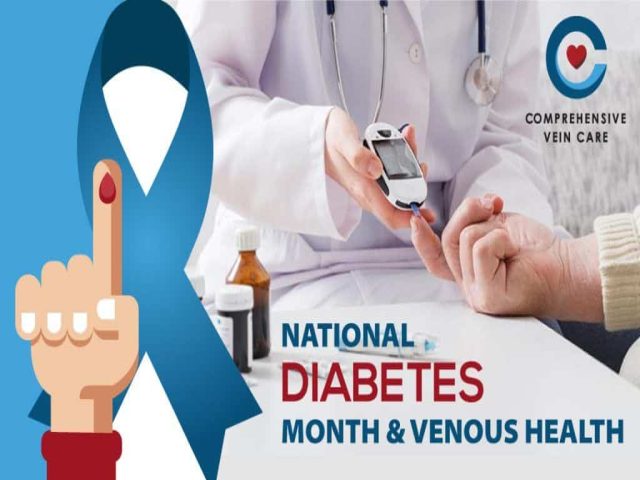Recent Blogs
- Caring for Your Friends’ and Family’s Vein Health
- Choosing the Right Varicose Vein Doctor
- Effective Vena-Seal Procedure for Varicose Veins
- 7 Effective Home Remedies for Managing Varicose Veins
- Is It Safe to Fly with Varicose Veins?
- Can Vein Disease Cause Skin Damage?
- What is The Cause For Itchy Varicose Veins?
- 8 ways to motivate yourself to walk
- Understanding the Difference in Treatment of Varicose and Spider Veins
- How Varithena works?
Published At: 07-Nov-2019

November marks the month for awareness of Diabetes. Although, varicose veins are not caused by diabetes, the combination of the two in your body can cause a considerable impact on your health.
High blood sugar levels due to diabetes can affect the blood vessels by weakening them. This weakness makes the venous system prone to infections as well as increase the risk of circulatory issues.
Varicose veins are commonly developed in the legs and are visible from the surface of the skin. However, they can also be buried deep in the tissues, unknown to our knowledge. Unlike the bulgy, rope-like varicose veins, a thread-like version with a red or blue appearance named Spider veins also exists. Varicose veins are not just superficial, they can cause cramping, pain, weakness and other symptoms that might be uncomfortable.
A common problem that would trigger both diabetes and varicose veins are obesity. Weight gain can contribute to the development of diabetes and the advancement of varicose veins. Additional stress on the circulatory and immune systems is placed due to the presence of varicose veins. Advanced diabetes might generate damage to nerves and tissues in your legs where varicose veins most commonly occur.
Deep Vein Thrombosis is another condition to look out for which also can be life-threatening. The possibility of developing this condition can increase as your circulation can be compromised due to the presence of both varicose veins and diabetes. Untreated varicose veins can increase the risk of skin ulcers and if a diabetic develops this condition, the likelihood of a serious infection would be higher. Therefore, it is highly advisable that patients with both conditions of diabetes and venous insufficiencies should take extra measures to keep health risks at bay.
A balanced diet and regular exercise seem like the answer to all complications. Actually, it is one of the key components when treating or maintaining diabetes and varicose veins.
Health Tips for living with varicose veins and diabetes
- Eat high-fibre food
- Avoid food containing high amounts of Sodium
- Exercise regularly
- When resting elevate your legs (above chest level)
- Avoid tight clothes
- Take regular breaks from sitting or standing for long periods
Treatment
Varicose veins can be treated even if you are diabetic (Type 1 or Type 2). As a diabetic, if you notice varicose veins symptoms in your legs, you should seek immediate medical attention. Your legs would be evaluated for vein disease by an experienced vein doctor who advises you on effective treatment methods.
Diabetics should be vigilant about any bodily changes. Inspect your legs and feet regularly and do not take venous irregularities lightly.
At Comprehensive Vein Care, we have minimally invasive treatments that can be performed without any numbing or anesthesia. Treatments would take effect immediately, allowing you to continue with your regular lifestyle. Visit us at our clinic in Springfield, Ohio or call us at 937-325-3830 to schedule a free consultation.